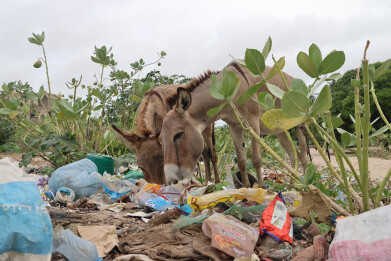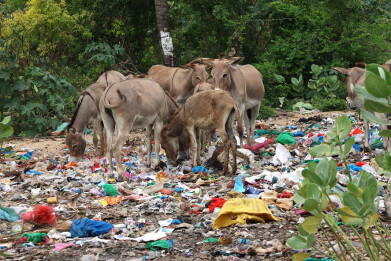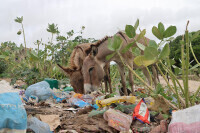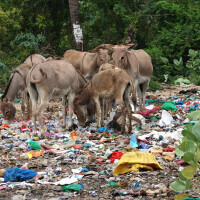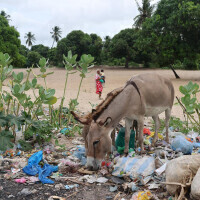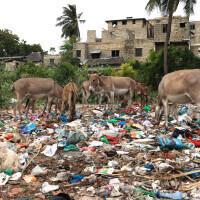Waste management
The Lethal Impact of Plastic Pollution on Donkeys in Kenya
Jul 11 2024
The Donkey Sanctuary's clinic on Lamu Island, Kenya, has reported a troubling increase in donkey fatalities due to plastic pollution at this UNESCO World Heritage site. Up to 5% of donkeys brought to the clinic exhibit signs of nutritional colic, a condition that is typically fatal. This alarming trend prompted a collaborative investigation between scientists from the University of Portsmouth and The Donkey Sanctuary to assess the effects of plastic pollution on donkeys and other livestock in Kenya.
While the detrimental effects of plastic pollution on marine life are well-documented, this study is one of the pioneering efforts to examine its impact on land-based ecosystems. The research team is analysing the foraging habits of donkeys and cattle in Lamu, as well as the extent of plastic ingestion, to fully grasp the severity of the issue.
In Lamu, donkeys and livestock are crucial to the local population. However, scarce edible vegetation forces these animals to forage at waste sites, where they consume plastic packaging and other debris mixed with food scraps. Preliminary findings indicate that donkeys are more vulnerable to death from plastic ingestion compared to cattle, due to their distinct biological and behavioural characteristics.
Dr. Obadiah Sing'Oei, Lamu Programme Manager and Clinic Lead at The Donkey Sanctuary, explained: “At the dumpsites, donkeys consume a variety of non-food items such as plastics, clothes, and cartons. This leads to significant health problems, with many donkeys suffering from often fatal nutritional colic. Additionally, some donkeys die from poisoning, such as from residual rat poison found at the dumpsites. The involvement of researchers from Portsmouth is vital in highlighting and addressing this growing crisis in donkey welfare.”
Dr. Leanne Proops, Associate Professor in Animal Behaviour and Welfare at the University of Portsmouth, added: “In many countries, including Kenya, domestic animals graze on open waste dumps, ingesting plastics that severely impact their health and welfare. Even if livestock appear unharmed, their meat and milk often contain microplastics, posing risks to human health. As plastic pollution worsens, it is crucial to understand its impact on these animals, which are integral to their communities.”
Dr. Emily Haddy, Postdoctoral Research Fellow at the University of Portsmouth, recently led community focus groups in Lamu with local livestock owners, vets, and residents to explore the challenges related to donkey welfare. She noted: “Community feedback has highlighted growing concerns about the links between plastic pollution, ecosystem health, animal welfare, and human well-being. Livestock owners, constrained by limited resources, often let their animals graze freely out of necessity. These focus groups have been invaluable in understanding how these intertwined issues affect both people and animals.”
Events
May 11 2025 Vienna, Austria
May 18 2025 Algiers, Algeria
23rd International Water Management Exhibition
May 20 2025 Prague, Czech Republic
Singapore International Water Week Spotlight 2025
Jun 23 2025 Singapore
Jun 25 2025 Sao Paulo, Brasil

